Resume Trends 2021 (Analysis of 670,000 Documents)
Create Your Resume Now
When creating your resume, you put a lot of work and commitment into it.
But competition in the job market is fierce, which raises the question—How well does your resume stack up against other candidates in your field? Is it actually that good, or is there some room for improvement?
We're here to help you find out.
We’ve analyzed more than 670,000 resumes created in our builder to get a snapshot of what a resume should look like in 2021.
We also took a look at what candidates across the most popular professions had to say about their work experience, career goals, and skills.
Finally, we crunched the numbers on how job seekers approach their job hunt in 2021. What keywords do they use to define their area of expertise? What is the length of their resumes? How many resume versions does each user make?
Our analysis has the answers.
What we've discovered about resumes (and how to use that knowledge to beat the competition)
Let's start with a look at what an average resume looks like in 2021.
Now let’s take a look at the details
Resume length
- Average resume length: 439 words
- Median resume length: 406 words
Distribution (limited to resumes of 1000 words or fewer):

For a typical resume created in our builder, the cut-off point for a single page is about 380 words. So the data clearly shows that the average candidate sticks to the classic one-page limit.
However, this is not the best possible strategy.
Contrary to popular belief, recruiters often prefer two-page resumes. Statistically, recruiters are 2.9 times more likely to choose a candidate with a two-page resume for management jobs and 1.4 times more likely for entry-level employment if the applicant has a two-page resume.
Furthermore, 77% of employers believe that seasoned professionals seem less experienced when utilizing a one-page resume.
This, however, wasn’t the worst resume gaffe we came across. Most job searchers commit a much worse offense.
Pay attention. This is the single biggest resume mistake that most candidates make.
How many resumes per user?
- Average resume number: 1.4 resume per user
- Median resume number: 1 resume per user
The figures above are particularly alarming.
Why? Because the most successful job-search technique is to adapt each resume to the job ad's requirements (63% of recruiters want to receive resumes tailored to the role).
In other words, you should make a new resume for each job application.
Yet—most users choose to write a single generic resume and attach it to all job applications. Here's why it's such a huge blunder:
- On average, only 10% of job applications result in an invitation to an interview.
- Just 20% of those who get an interview are offered a job.
- So the success percentage of job applications ranges from 2% to 3.4%, depending on the study.
- That means you'll need to send between 30 and 50 resumes to land a job
And copying and pasting the same old resume into every application just won’t cut it.
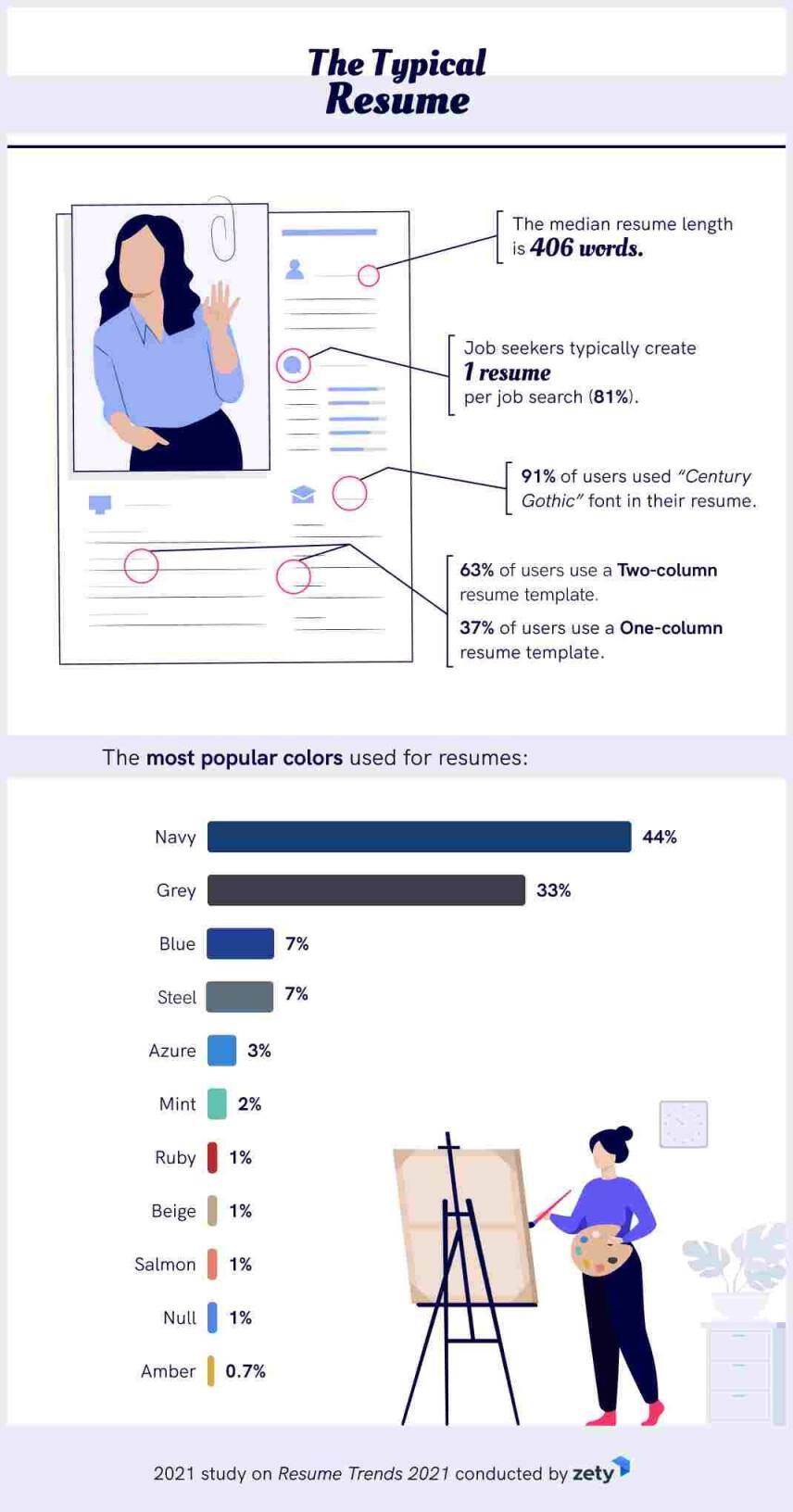
It’s not all bad news, though.
Some job seekers do create multiple resumes tailored to the requirements of each employer. We noted some particularly diligent candidates had created more than 100 resumes.
The user with the most resumes had produced 363 unique documents. Is this the approach we suggest when adapting your resume to the job description? Perhaps not. Is it more successful than spamming 300+ firms with the same resume?
The answer is a resounding yes. Every reputable career expert and recruiter recommends you tailor your resume to the job description. It’s hard to quantify, but we’d guesstimate it’s 10x more effective than using the same resume every time.
However, only 2% of all users have created 5 or more resumes.
Now let's take a look at the actual content of an average resume in 2021.
What resume sections do job seekers use?
Almost every user we analyzed included the five main resume sections. These are the sections considered a must-have by most employers and recruiters.
Here are the numbers.
Standard must-have resume sections:
- Personal Information: 99% of resumes
- Education: 99% of resumes
- Work Experience: 97% of resumes
- Resume Summary or Objective: 95% of resumes
- Skills: 95% of resumes
These sections are the gold standard. And what’s particularly promising from our perspective is how common the skills section, as well as the heading statement (Summary or Objective) are.
We encourage every job seeker to include those sections on their resume and make sure they’re written well.
That’s because recruiters really want to learn about your abilities. So it’s critical that you include them.
In fact, according to the American Sociological Review, not using a list of professional skills can hurt a resume as much as one year of unemployment.
And despite it being a bone of contention amongst career experts, it's an excellent practice to include a heading statement.
Just don't make it seem like an old-fashioned aspirational career goal, and stick to what you can contribute to the employer.
But today's job seekers don’t limit themselves to traditional resume sections. Most of them include at least one extra resume section to show they have something more to offer.
Need some inspiration? Here are the most popular additional resume sections as revealed by our analysis.
Additional sections:
- Languages (36%)
- Certifications (27%)
- Custom (user-defined) section (25%)
- Interests (17%)
- Software (17%)
Note that while certificates are the second most common extra section, only one in four job seekers lists them.
But it’s the single most provable method of demonstrating your knowledge. So if you have any certifications, make sure to list them separately and prominently on your resume.
And for some professions, certifications are even more important. Registered Nurses, Civil Engineers, Mechanical Engineers, Accountants, and Project Managers all use certifications significantly more than other professions.
So if you happen to work in one of those industries, pay even closer attention to your Certifications section.
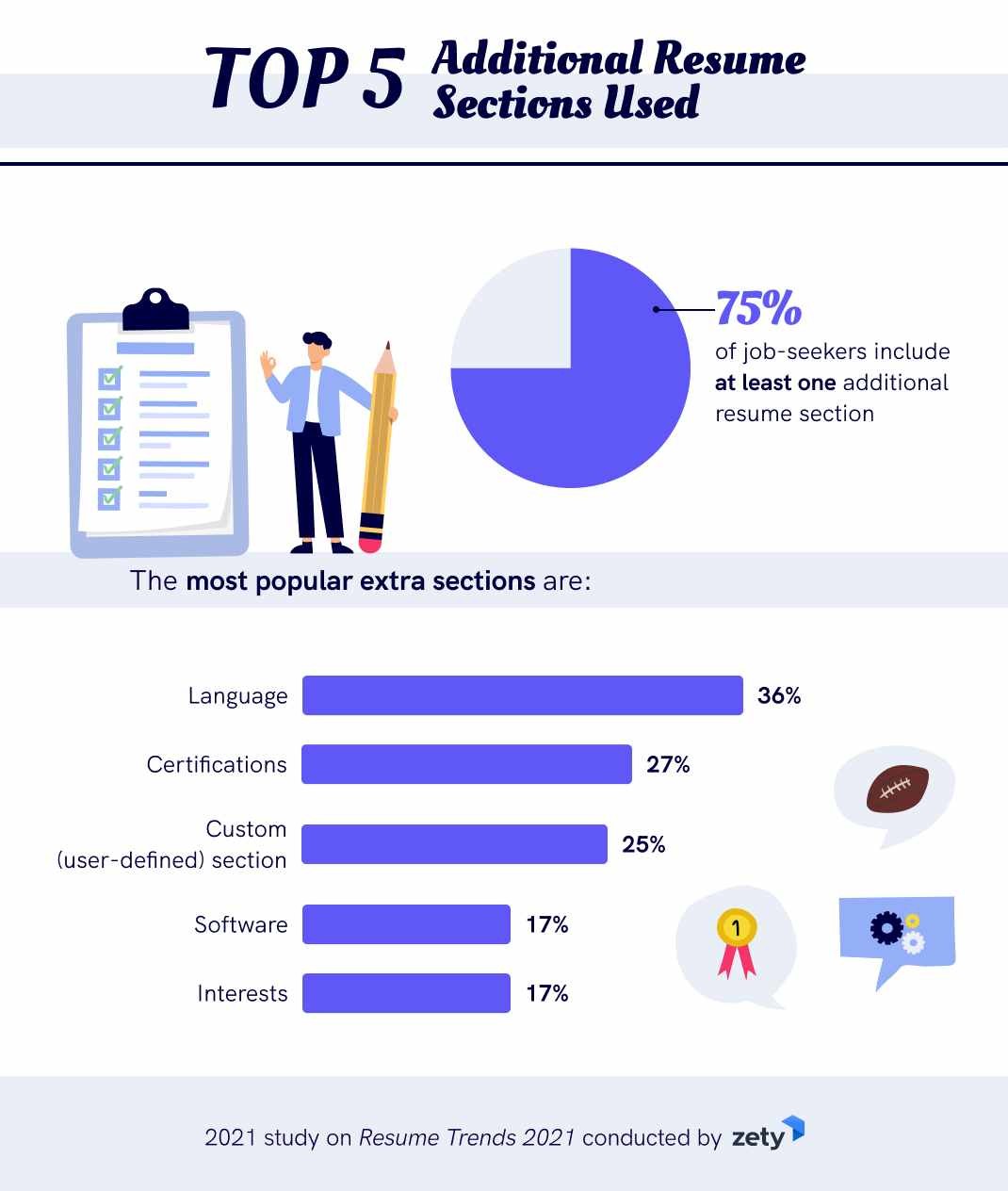
Most Common Resume Skills
Finally, let's take a look at the most frequent skills included on resumes by job seekers.
Why is it important? Think about it in terms of supply and demand. When some talents appear on resumes more frequently than others, it tends to be because recruiters want to see such skills.
You don’t have to include every skill below on your resume. Remember, you should always tailor your resume to the job requirements.
But if you genuinely have any of these skills, and it’s relevant to the role, then be sure to include a few of them. Pay special attention to soft skills, as these are vital for every job and highly sought after by all employers.
Top 10 most common soft skills listed in resumes
- Communications (14%)
- Customer Service (9%)
- Project Management (7%)
- Time Management (6%)
- Leadership (5%)
- Problem Resolution (5%)
- Problem-Solving (5%)
- Team Management (5%)
- Quick Learning (4%)
- Teamwork (4%)
Top 10 most common hard skills listed in resumes
- Microsoft Office (7%)
- Microsoft Excel (5%)
- Strategy Planning (4%)
- Python (4%)
- Java (3%)
- SQL (3%)
- Data Analytics (3%)
- JavaScript (3%)
- HTML5 (3%)
- Microsoft PowerPoint (3%)
Note: 9 out of 10 most common hard skills are software skills.
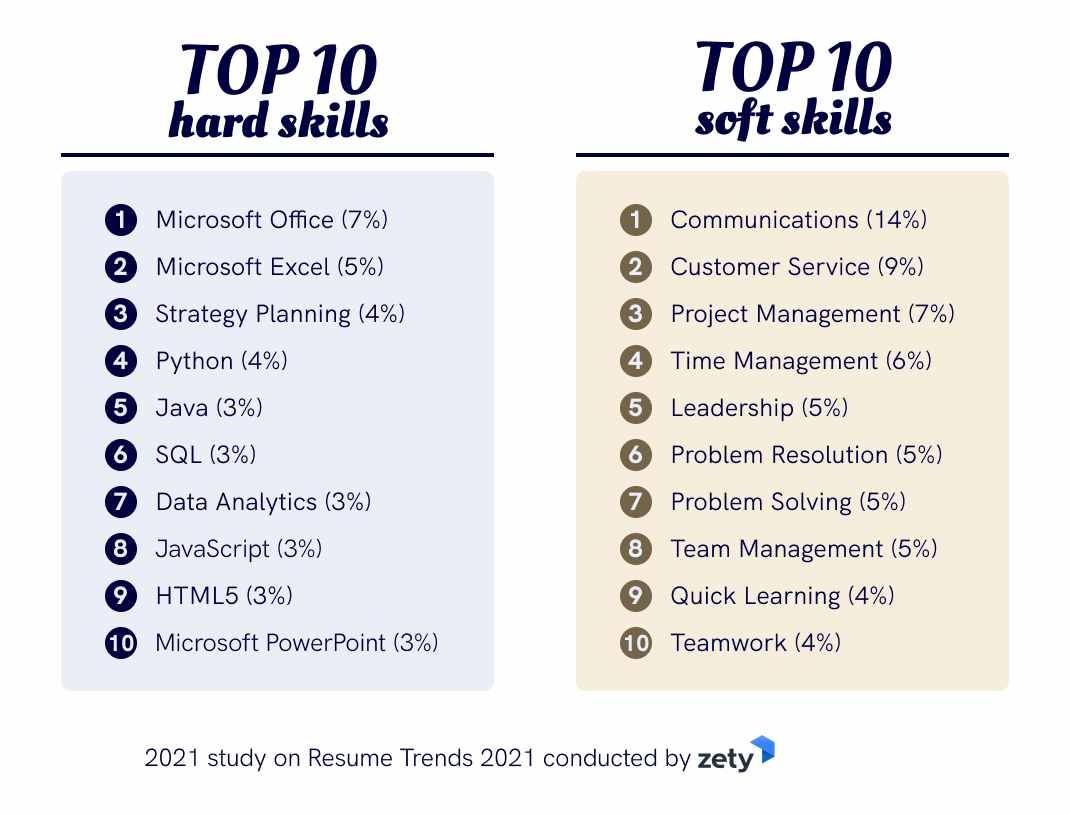
Believe it or not, studies reveal that learning more than one language significantly improves your employment prospects.
With so much business being online, many businesses now cater to a worldwide audience. As a result, many firms find it advantageous to recruit staff who can communicate in more than one language. You’re more valuable if you can communicate with as many of their consumers as possible.
Furthermore, learning a second language opens up more work options and increases your earning potential. Depending on the language, you could earn from 5% to 20% per hour higher than the base wage for single language speakers.
English is, of course, the most common language stated on resumes. But what other languages have a large following?
Top 10 most common languages listed in resumes
- English (69%)
- Hindi (19%)
- Spanish (16%)
- French (11%)
- Arabic (9%)
- German (7%)
- Tamil (5%)
- Russian (4%)
- Telugu (3%)
- Marathi (3%)
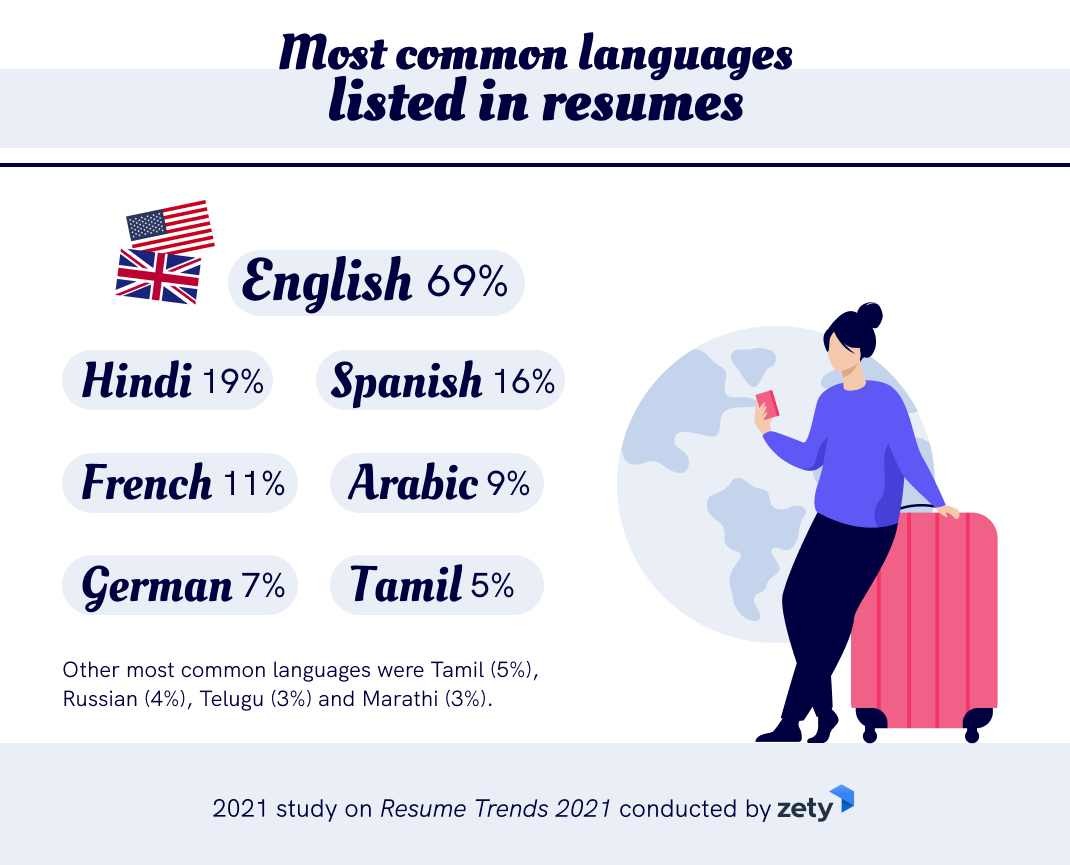
However, it isn’t just human languages that are a popular choice in resumes. When it comes to the most common hard skills, programming languages took 5 of the 10 most popular positions. This is also reflected in the most popular computer skills listed on resumes.
Top 10 most common computer skills listed on resumes
- Microsoft Office (25%)
- Microsoft Office Excel (19%)
- Teamwork adaptability (14%)
- Microsoft Office Word (13%)
- Microsoft Office PowerPoint (11%)
- Photoshop (8%)
- Python (7%)
- AutoCAD (5%)
- SQL (4%)
- MATLAB (4%)
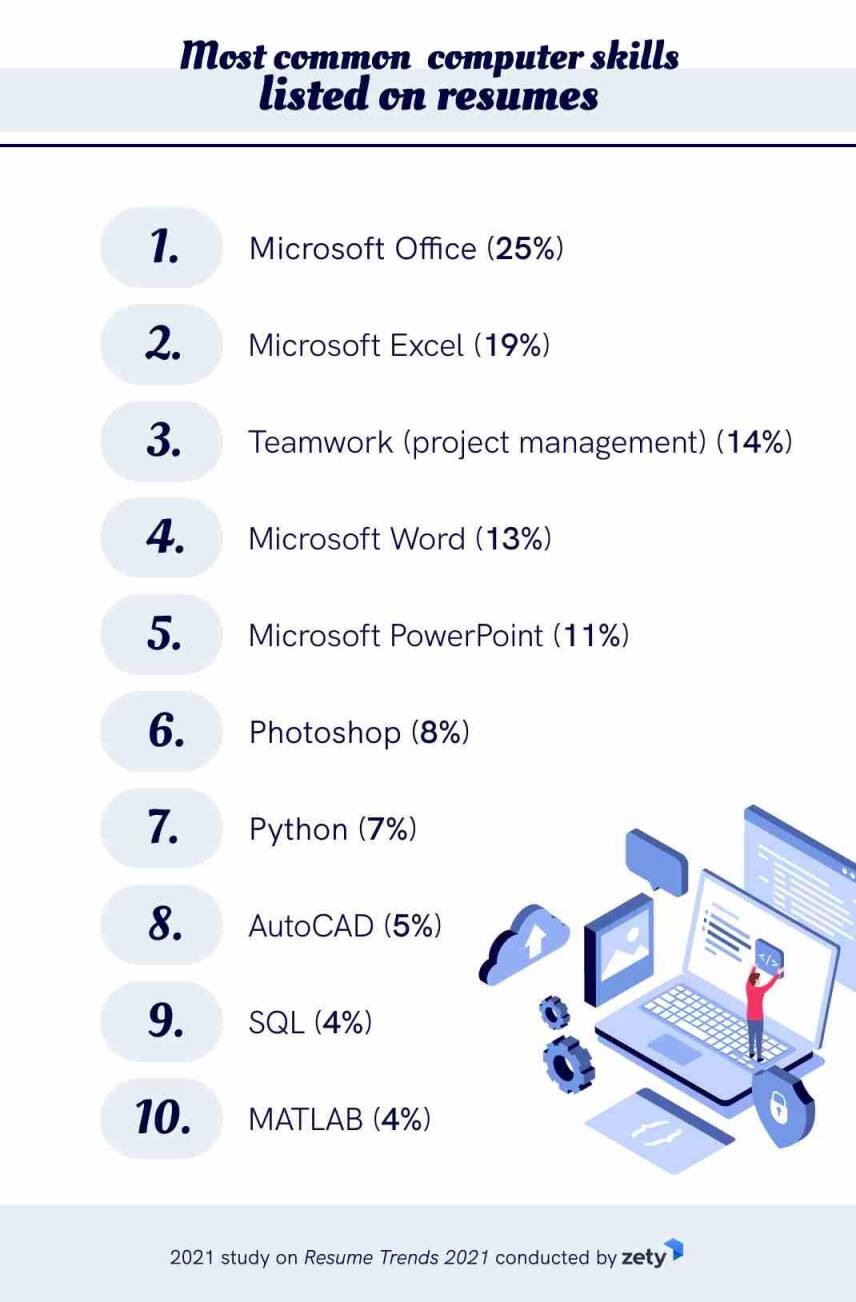
Hobbies and Interests on Resumes
Interests are subjects that fascinate you, and you want to learn more about.
But when it comes to your resume, you need to take care. Selecting hobbies and interests is about choosing what aspects of your personality and professional skills you want to emphasize and communicate.
So rather than being interesting to you alone, the hobbies and interests you put on your resume should say something about you to the hiring manager. You can use them to:
- Resonate with the interviewer.
- Give them an entry for an ice-breaker question.
- Signal professional skills and traits they might be looking for.
And that’s exactly why the right and interesting selection of hobbies included in the resume is so important. Does this mean that popular interests should be avoided? Not necessarily. Is it worth considering an interesting perspective on them? Absolutely.
Focus on the unique aspects of your hobby. Don’t just say “blogging.” Specify what you blog about and how successful your blog is. And try to match your hobbies and interests to the requirements of the job.
If the role requires an outgoing team player, then sports would be a great choice.
And below you will find a list of the interests most commonly mentioned by our users:
Top 10 common interests listed on resume
- Reading (26%)
- Blogging (17%)
- Travelling (15%)
- Music (7%)
- Sports (5%)
- Cooking (5%)
- Photography (5%)
- Football (3%)
- Swimming (3%)
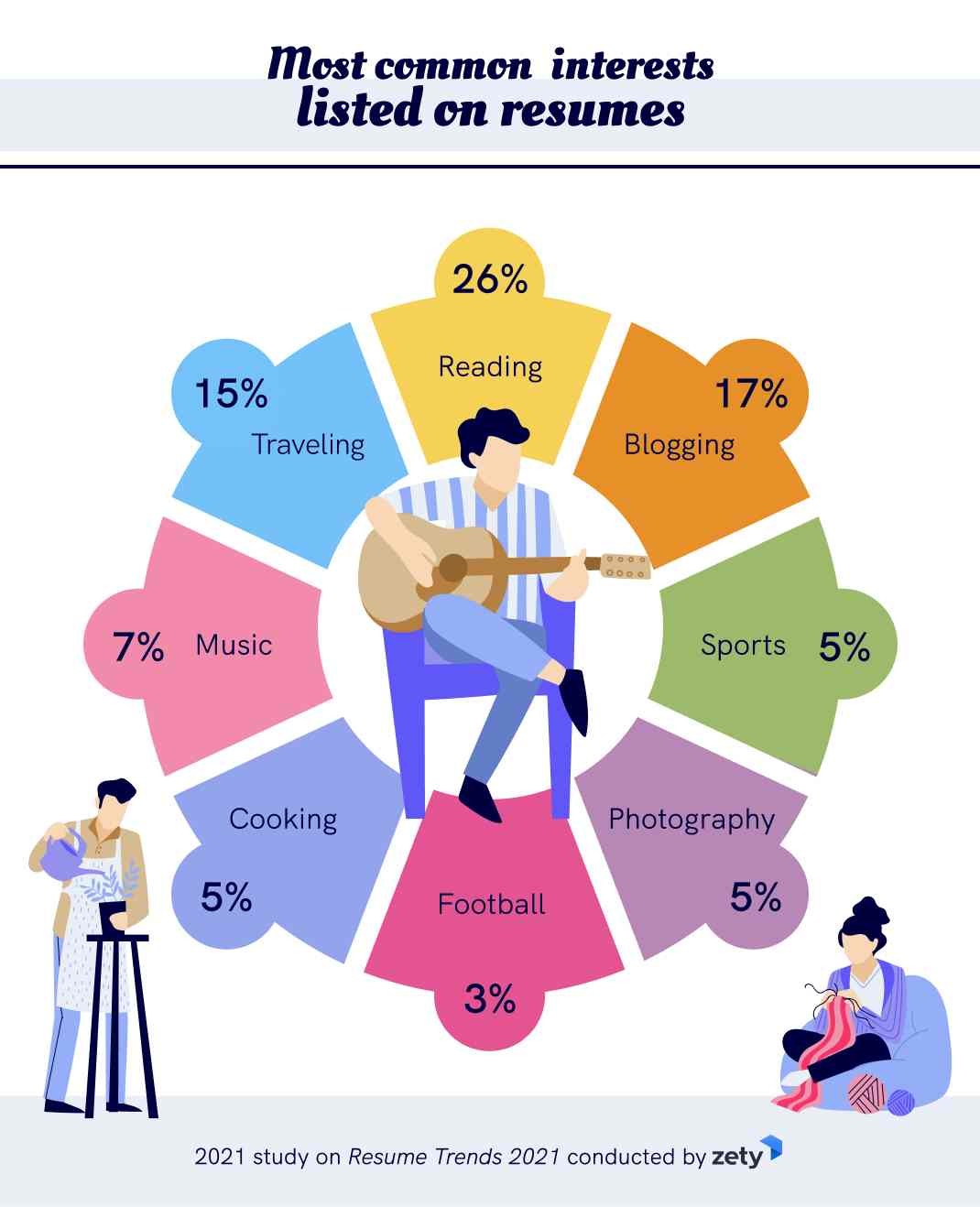
Keywords are key
In our study, we also looked at the most popular keywords used in resumes.
Resume keywords describe experience, skills, traits, and the job title itself. Hiring managers and Applicant Tracking Systems alike scan resumes looking for these keywords to see if the candidate matches the requirements for a job.
If you don’t have what they’re looking for, then they’ll move on to someone who does. So it pays to know what keywords are expected.
And again, don’t just copy these lists into your resume. Incorporate keywords naturally into your resume content and keep them relevant to the job.
When we carried out our analysis we split our datasets according to profession. Below you’ll find the keywords used in three of the most popular professions amongst our users.
Top 10 Software Engineer Keywords
- Engineer
- JavaScript
- Software
- Java
- Backend
- Development
- Python
- Developer
- Years
- Angular

Administrative Assistant
- Administrative
- Assistant
- File
- Skills
- Environment
- Service
- Offering
- Concurrent
- Strong
- Team

Project Manager
- Construction
- Project
- Management
- Manager
- Skills
- Milestones
- Years
- Specification
- Parse
- Projects

Summary
There is no single “right” way of crafting your resume. It’s a document that should be as unique as the person who writes it.
But there are some simple rules, backed up by our data, that will allow you to stand out from the crowd and win the hearts of recruiters.
Here’s what you need to remember:
- Most job seekers write one-page resumes, but you don’t have to. A two-page resume is often preferred by recruiters, especially for more experienced candidates.
- Most job seekers keep reusing the same resume for multiple job applications. Don’t follow their lead. Write a fresh, specifically targeted resume for each role.
- You should add extra sections to your resume, and a certifications section is particularly important if you’re a nurse or an engineer.
- Know what keywords are expected for your job. If you fail to include them, you’re setting yourself up for rejection.
Follow this simple advice, and you'll earn credibility with recruiters and hiring managers, boosting your employability chances in the process.
Methodology
For this study, we extracted data from over 2,000,000 resumes created with our resume builder. To keep the data more relevant, we limited the analysis to downloaded resumes only (assuming those were actually used in the job search). For the analysis of the most common entries, skills, and keywords, we further limited the sample to one document per user—leaving us with 670,437 resumes.
The data for the most popular professions comes from documents in which a user’s job title exactly matches the job title discussed (i.e. for a given resume to be included in the “software engineer” resume analysis, the job title on the resume must read “Software Engineer” with no permutations such as “Senior Software Engineer” etc.).
Limitations
The accuracy of the data regarding the most common skills and foreign languages is limited by users’ inconsistent spelling and phrasing. We tried to include all possible variations of skill descriptions (e.g. “MS Office” or “Microsoft Office”, as well as “Spanish” or “Spanish: Fluent,” etc.), but certain instances might have been omitted. The percentages denoting the most common skills and foreign languages listed by users might be underestimated by up to 0.5.
Sources
- 10 Current Resume Trends & Forecasts You Should Be Thinking About
- Can Speaking Two Languages Increase Your Job Prospects?
- Costly Mistakes: Why and When Spelling Errors in Resumes Jeopardise Interview Chances
- Creating a Strong Resume
- Employers Share Their Most Outrageous Resume Mistakes and Instant Deal Breakers in a New CareerBuilder Study
- Soft Skills That Employers are Seeking
Fair use statement
Do you want to help others improve their resume? Inspire your network by sharing this article on your page and social media.
If you think your audience will be interested in this information, we’d love you to share it for noncommercial reuse. All we ask in return is that you link back here so that the authors get full credit and your readers can view the full study.
About Us
Zety analyzed thousands of job applications to create the best cover letter templates out there. Braced with this knowledge, our experts advise on modern resume formats, professional resume templates, and even which skills are must-haves on resumes.
Article summary
The article "Resume Trends 2021: Best Practices for Job Seekers" discusses the latest trends and best practices for creating a strong and effective resume in 2021. The article highlights the importance of incorporating keywords, using a clear and concise format, and tailoring the resume to the job description. Additionally, the article recommends using metrics and data to quantify achievements, including a summary statement at the top of the resume, and utilizing online tools to enhance the design and appearance of the document. Finally, the article emphasizes the need for job seekers to continuously update their resumes and tailor them for each job application.
About Zety’s Editorial Process
This article has been reviewed by our editorial team to make sure it follows Zety's editorial guidelines. We’re committed to sharing our expertise and giving you trustworthy career advice tailored to your needs. High-quality content is what brings over 40 million readers to our site every year. But we don't stop there. Our team conducts original research to understand the job market better, and we pride ourselves on being quoted by top universities and prime media outlets from around the world.
